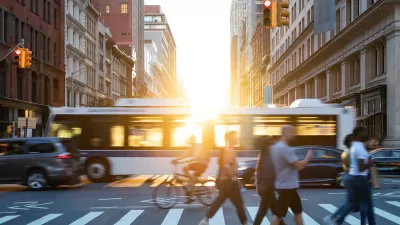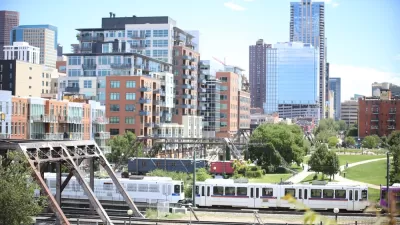If approved, the proposed regulations would require developers to implement policies to reduce single-occupancy vehicle trips for new developments.

A proposal before Denver's city council would "would require developers to implement specific programs to reduce the number of single-occupancy vehicle trips taken by tenants of new developments," writes Conor McCormick-Cavanagh in Westword. The plan calls for creating a set of transportation demand management goals that developers must consider when planning new construction. "For example, the proposal suggests, developers could offer subsidized transit passes for tenants or install showers, lockers and changing rooms for people who bike to work."
According to Alana Miller of the NRDC, who has been working on a transportation demand management proposal with the city's Department of Transportation and Infrastructure (DOTI), "there are benefits from a climate perspective, from air pollution, public health and affordability. It gets at quality of life and how Denverites have access to get around the city and go about their daily lives and do that in a more sustainable, accessible and affordable way." If approved, the rules would apply to all new commercial, residential, industrial, or office developments over a certain size.
The proposed rules intentionally give developers many options. "There’s tons of different transportation demand management strategies that can be implemented. And developers want to choose a strategy that makes sense for their building, their location and their tenants,' says Matt Kaufman of Urban Trans North America." But the plan's authors insist "this program does have teeth" and includes "compliance requirements and enforcement mechanisms." Other cities and counties such as San Francisco and Virginia's Fairfax County have adopted similar programs to reduce congestion and demand for single-occupancy car trips and improve opportunities for walking, biking, and public transit.
FULL STORY: Denver Wants New Developments to Help Reduce Cars on the Roads

Planetizen Federal Action Tracker
A weekly monitor of how Trump’s orders and actions are impacting planners and planning in America.

San Francisco's School District Spent $105M To Build Affordable Housing for Teachers — And That's Just the Beginning
SFUSD joins a growing list of school districts using their land holdings to address housing affordability challenges faced by their own employees.

The Tiny, Adorable $7,000 Car Turning Japan Onto EVs
The single seat Mibot charges from a regular plug as quickly as an iPad, and is about half the price of an average EV.

Seattle's Plan for Adopting Driverless Cars
Equity, safety, accessibility and affordability are front of mind as the city prepares for robotaxis and other autonomous vehicles.

As Trump Phases Out FEMA, Is It Time to Flee the Floodplains?
With less federal funding available for disaster relief efforts, the need to relocate at-risk communities is more urgent than ever.

With Protected Lanes, 460% More People Commute by Bike
For those needing more ammo, more data proving what we already knew is here.
Urban Design for Planners 1: Software Tools
This six-course series explores essential urban design concepts using open source software and equips planners with the tools they need to participate fully in the urban design process.
Planning for Universal Design
Learn the tools for implementing Universal Design in planning regulations.
Smith Gee Studio
City of Charlotte
City of Camden Redevelopment Agency
City of Astoria
Transportation Research & Education Center (TREC) at Portland State University
US High Speed Rail Association
City of Camden Redevelopment Agency
Municipality of Princeton (NJ)





























